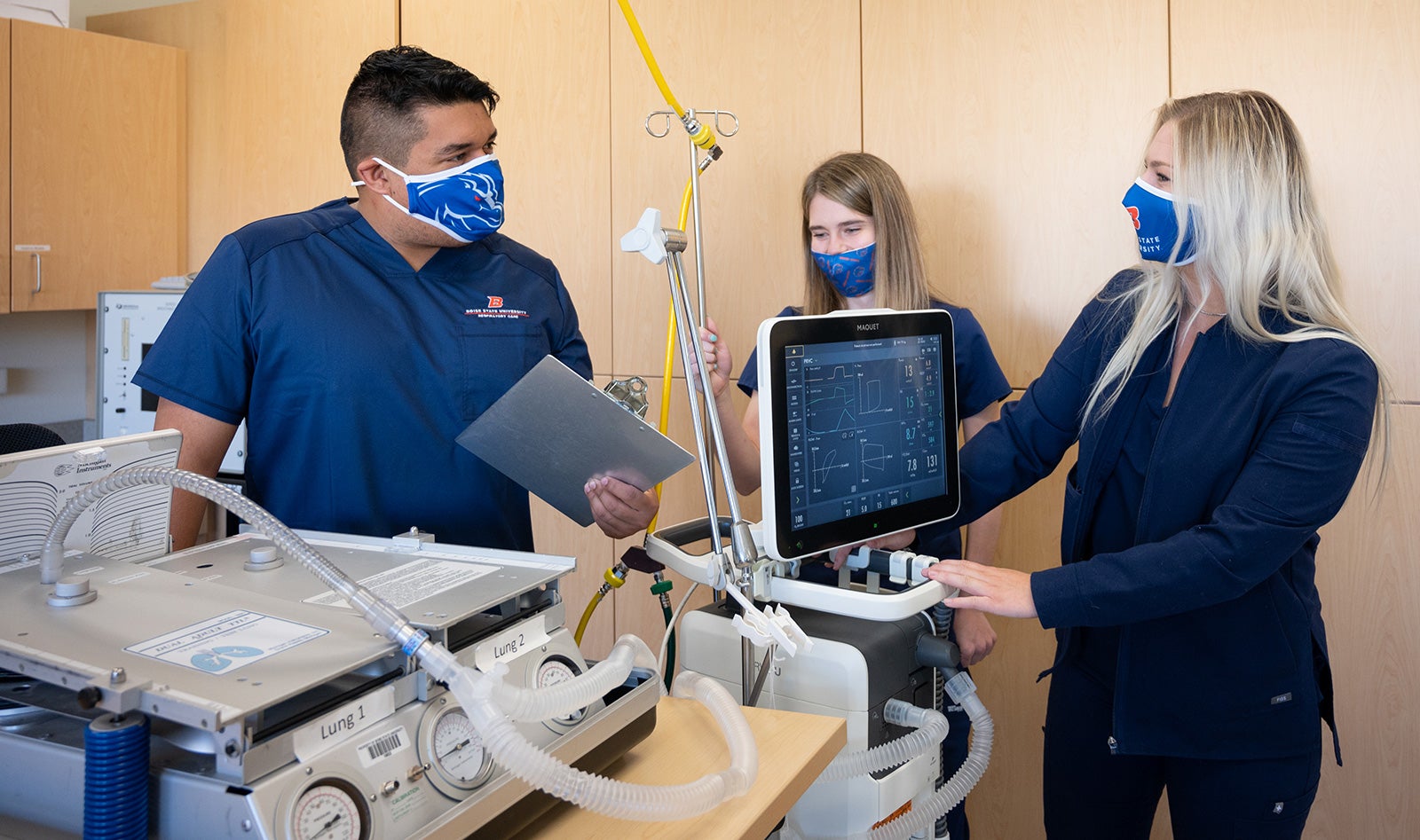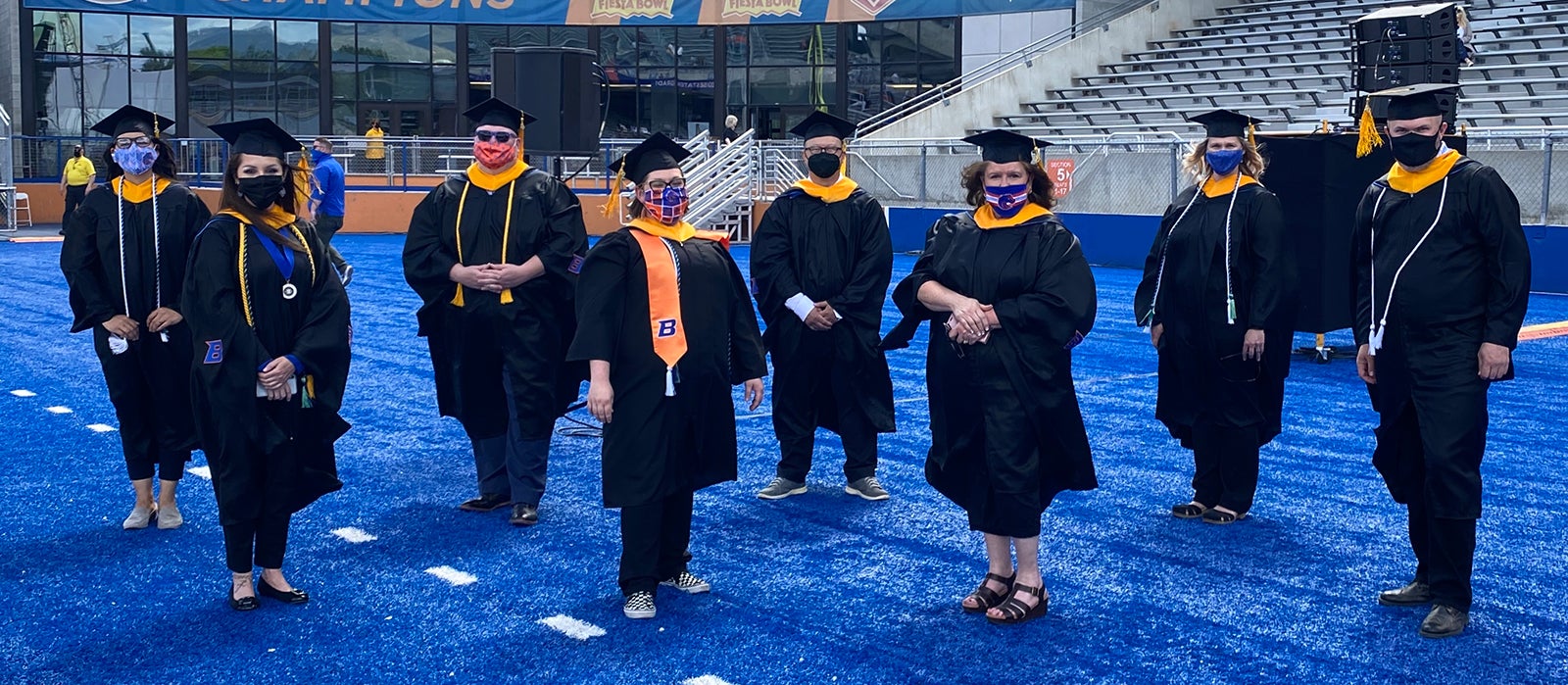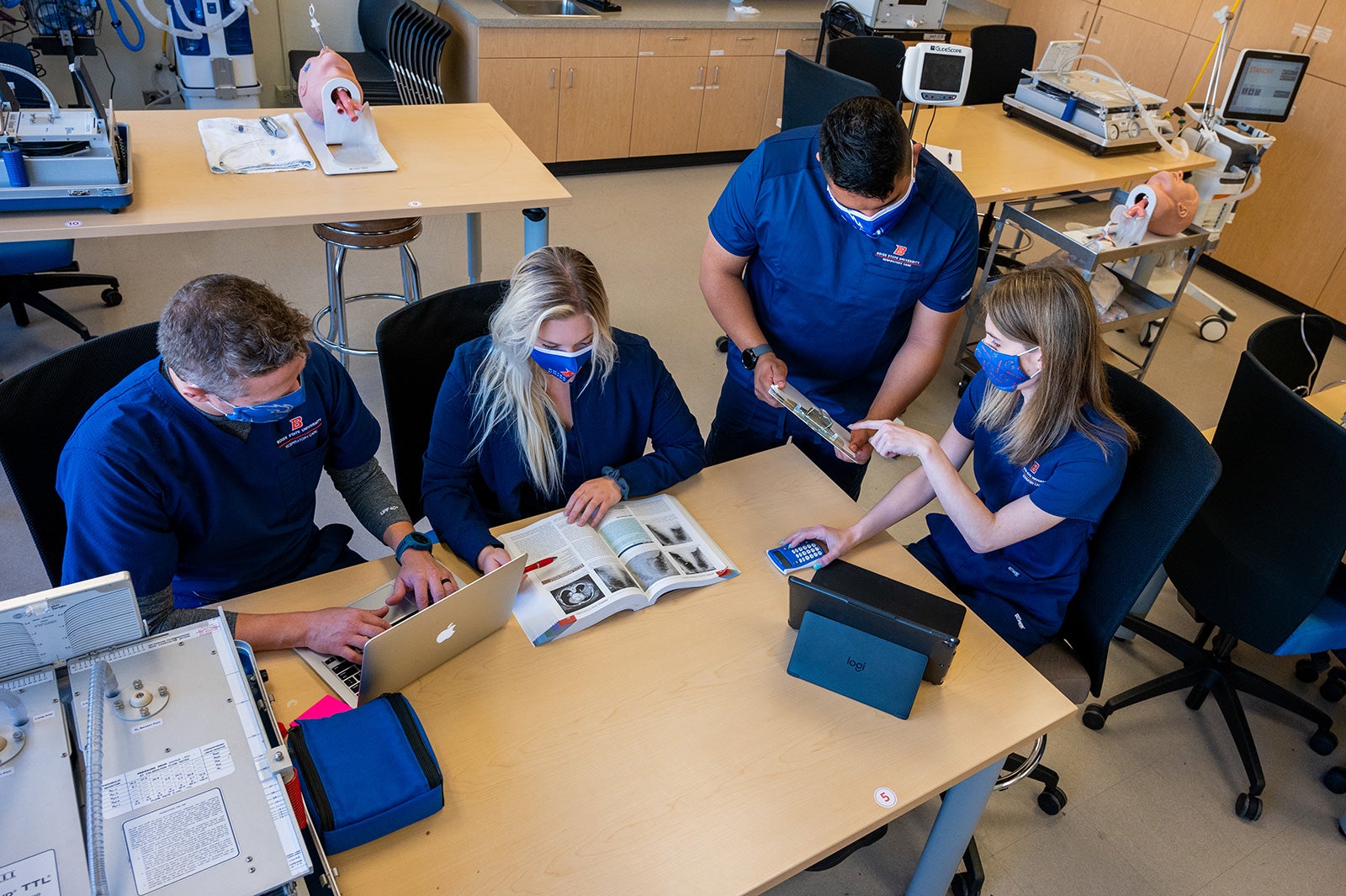
It’s a specialty within medicine that isn’t even recognized in many of the world’s countries. But as many physicians and nurses who struggled to meet the demands of very complicated patients throughout the COVID-19 pandemic would attest, dedicated respiratory care can make the difference between life and death.
Which is why the faculty and administrators of Boise State’s respiratory care program, one of the best in the nation, have spent the past year raising the profile of the program and the professionals it produces – and earning the recognition you’d expect to accrue around a world-class program.
As is true of many of the College of Health Sciences programs, the Department of Respiratory Care is staffed by many who are both professionals in the field and graduates of the program. Department Chair Megan Koster, for example, received both her bachelor’s and master’s degrees through Boise State (she also has her doctoral degree and is a registered respiratory therapist) and worked extensively in respiratory care in neonatal and pediatric hospital settings before moving exclusively into academia several years ago.

In addition to leading the department, Koster also directs the online master of science in respiratory care (MSRC) program for respiratory therapists already in practice. There is also an on-campus program that orients students to the field that can lead to a bachelor of science degree in respiratory care (BSRC) and an online RRT-BSRC program designed to advance associate degree, registered respiratory therapists to the bachelor’s level degree. That 30-credit program, which features rolling admissions and is staffed by five full-time faculty members and several adjunct instructors, is the largest of its kind in the world. The highly successful RRT-BSRC program is directed by another Boise State respiratory care alum, TJ Wing.
Camille Stover, also a program graduate, directs the entry-level, on-campus BSRC program, which has received distinguished credentialing honors for two years in a row, while the MSRC program is a 2021-2022 American Association for Respiratory Care (AARC) Apex Award honoree. Among the department’s other achievements, honors and efforts in the past year:
- Authorship of an American Association for Respiratory Care Leadership Institute module
- Two articles in the American Association for Respiratory Care Education Annual showcase of best practices
- An article in the Journal of the American Medical Association’s Surgery specialty journal
- An article in the Internet Journal of Allied Health Sciences and Practice
- An article in the International Journal of Health Sciences Education
- Three faculty members presenting at the American Association for Respiratory Care Summer Forum
- Two faculty members presenting at the American Association for Respiratory Care Congress
- One faculty member presenting at the American Association for Respiratory Care Open Forum
- Students presenting at the American Association for Respiratory Care Congress Open Forum
- Multiple presentations through journals and podcasts, state conferences, awards for interns and involvement with professional organizations
All of the articles and involvement across multiple professional organizations coincided with the inordinately demanding instruction conditions posed by the pandemic. At the same time, instructors were involved with community outreach and education for Cascade Medical Center, integrated mental health support for entry-level students and reimagined simulation training, given viral transmission concerns having to do with COVID-19.
Koster knows why it works: It’s a philosophy, rather than an educational program.
It’s also why the program has thrived in some of the most challenging times – and not only pandemic times. Koster recalls that when funding took a hit in 2007, faculty members dug deep, innovating to launch the now highly successful RRT-BSRC degree advancement program as an online program, one of the first within the College of Health Sciences and at Boise State. It was a significant investment of time and resources by the small department – with a big payoff over time, and an example of the innovative mindset that the department has continued to embrace.
“When I was a student in the program, we had faculty who created a community of caring,” she said. “That culture of caring, that culture of being student-focused, spilled over into the online setting.”
Hiring alumni nurtured in that type of environment, who have experienced success in the field, is another ingredient in the secret sauce.

“It really does perpetuate that community of caring and student-centeredness,” Koster said. “Our faculty care so much about our students. Everything we do is student-centered.”
That focus has been especially important as young people contemplate a career that, as the pandemic showed, can be highly challenging. Department faculty and staff have understood that, and responded with flexibility and compassion.
“It’s really important that people feel valued,” Koster said, adding that in the department, “When you’re in our programming, you’re basically a member of the ‘Go Bronchi!’ family.
“It really comes down to us being invested in our students and the department,” she said. “It’s about what’s best for the student and what’s best for the profession.”
The department has a long history of this deep level of care for participants. Koster herself was struck by it when she came through as a student nearly two decades ago.
“You could see their passion for the profession and you could feel their care for the students,” she recalled.
For a field that most aren’t aware of – people have a broad idea of nursing, for example, or what a family doctor does – Koster’s department inspires ongoing commitment and respect, increasingly across the nation and the world. Graduates are highly sought; she has heard more than once, “Wow, send more Boise State grads.”
And the seeds planted in Boise are now sprouting at such hospitals and locations as Massachusetts General Hospital, the University of California, Davis, Seattle Children’s Hospital, the University of Virginia and other care settings. Affiliations with those health systems and others mean that groups of Boise State respiratory care students are able to engage in remote clinical practice, completing hours in those settings and coursework online while they’re at those locations.
This feature of the program, built and expanded strictly based on the program’s reputation, is continuing to grow, and an informal alumni network is springing up around it, so that graduates in those parts of the country often host students taking part, providing a valuable bonding and mentoring component along with the placement.
“It has been really intentional, just perpetuating that culture of care, raised in the Boise State values of inclusivity and diverse thinking, and as President (Marlene) Tromp says, ‘blue turf thinking,’’ Koster said.
“They’re hiring our graduates.”
Learn more about Boise State’s Department of Respiratory Care